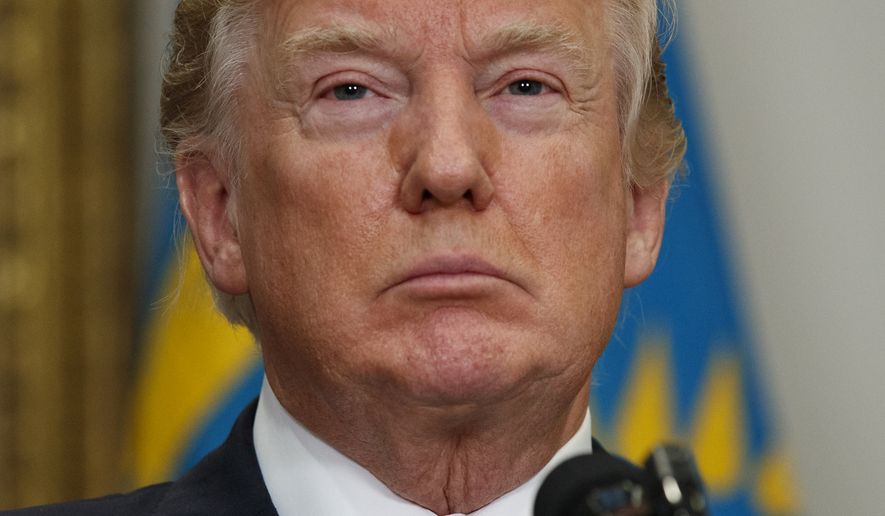President Trump has now amassed his first $1 trillion in debt, crossing that ignominious mark late last week — and analysts said it’s just a taste of what’s to come after the tax-cuts and spending spree of recent months.
Indeed, his next $1 trillion could come within a year, and one analyst said he could soon be staring at $3 trillion annual deficits if things go particularly badly in interest rates.
It’s a major reversal for a president who during the campaign had said given eight years he could eliminate the debt entirely, but is instead looking at setting records for red ink.
“We are in for a rude awakening,” said Maya MacGuineas, president of the Committee for a Responsible Federal Budget.
Her organization calculated that with December’s tax cuts and January’s budget-busting spending deal, Mr. Trump has already signed legislation that will add at least $2.4 trillion to the debt in the next decade and, should Congress make those policies permanent, could add as much as $6 trillion.
At that rate, the government will be paying $1 trillion a year in interest payments alone.
Mr. Trump at this time last year was crowing over the debt, which stood at $19.947 trillion and quickly dipped after his inauguration. He took to Twitter to demand credit.
“The media has not reported that the National Debt in my first month went down by $12 billion vs a $200 billion increase in Obama first mo.,” he wrote.
But the tally hit $20.957 late last week and stood at $20.958 trillion as of Wednesday — the latest numbers available from the Treasury Department.
He’s not the fastest to add his first $1 trillion. That would be President Obama, who did it in little more than six months, after inheriting a recession and the Wall Street bailout from his predecessor.
But Mr. Trump’s nearly 14-month span is worse than Presidents Clinton, George W. Bush, and all who came before them.
After touting his early successes Mr. Trump has gone silent this year.
He’s mentioned the debt just once, in passing and in relation to the country’s trade deficits, in his public appearances.
The White House budget office also didn’t respond to requests for comment Thursday about the increase or the worrying trajectory.
Analysts said presidents inherit the economy and policies of their predecessors — in Mr. Obama’s case, a recession and the ongoing Wall Street bailout — so the early debt figures don’t necessarily reflect the new administration.
But they also said Mr. Trump’s comments last year leave him open to the examination.
“The fact that we have now hit $1 trillion in additions to the total debt isn’t something he should be entirely accountable for, but it is a standard he put out there,” Ms. MacGuineas said.
What the president will have to answer for, she and other analysts said, is December’s tax cuts and January’s budget deal, which will combine for a hole trillions of dollars deeper than it would have been otherwise.
Brian Riedl, a senior fellow at the Manhattan Institute for Policy Research, said the tax and spending bills will add about $3 trillion to the debt, in addition to $10 trillion already baked in from previous government spending patterns.
“I project the budget deficit will top $1 trillion by next year, and reach $2 trillion within a decade – or even approach a staggering $3 trillion if interest rates rise back to 1990s levels,” he said.
There’s little sense that anything will change.
Mr. Trump’s budget director has said the president won’t consider changes to Social Security or Medicare. And when House Speaker Paul D. Ryan suggested in December that the GOP would use the fast-track budget process to attempt those changes, his idea was quickly batted down by Senate Majority Leader Mitch McConnell.
Yet the consequences of inaction could be serious.
In an open Senate hearing last month about the security challenges facing the U.S., Director of National Intelligence Dan Coats called exploding red ink a “dire threat” to the country. That put it on par with problems such as international terrorism and cyber warfare.
The Congressional Budget Office regularly issues warning to Congress that debt will eventually begin to crowd out private investment and there could come a point at which others become reluctant to purchase U.S. government debt.
But new Federal Reserve Chairman Jerome Powell told Congress last month that’s “not this time, by a long shot.”
“There could come a time where the public, the global debt buying public would come to the view that we either weren’t prepared to honor our debts or we couldn’t service them. But we’re a long way from that,” he said.
• Stephen Dinan can be reached at sdinan@washingtontimes.com.




Please read our comment policy before commenting.